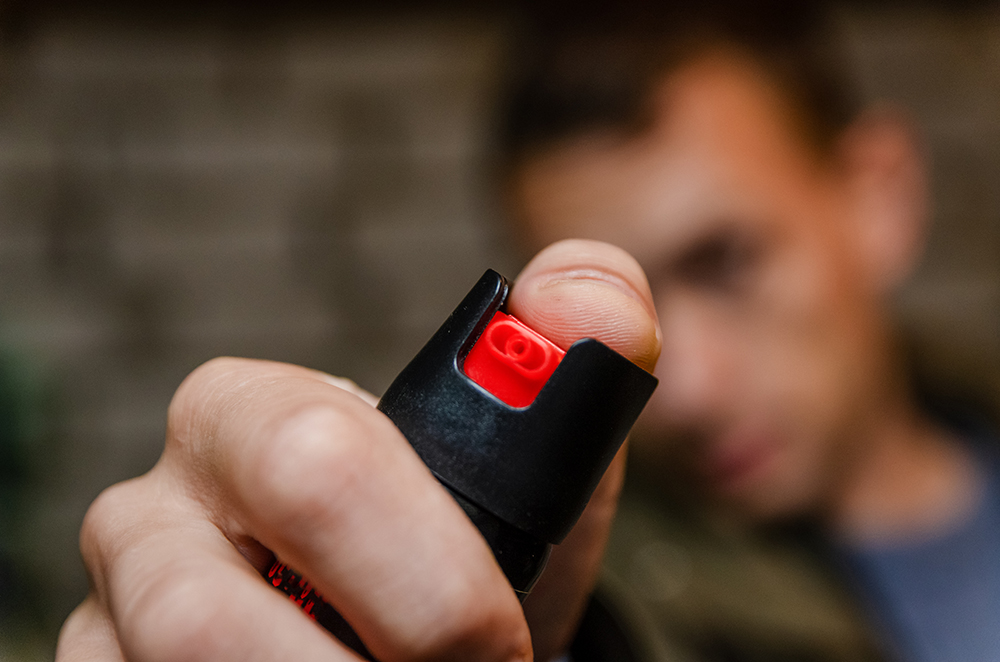Is Pepper Spray Legal in Canada?
Whether pepper spray is legal in Canada depends on characteristics of the specific product, what it was designed for, and the intended use.
The Criminal Code of Canada’s Regulation Prescribing Certain Firearms and Other Weapons as Prohibited or Restricted defines prohibited weapons as:
Any device designed to be used for the purpose of injuring, immobilizing or otherwise incapacitating any person by the discharge therefrom of
(a) tear gas, Mace or other gas, or
(b) any liquid, spray, powder or other substance that is capable of injuring, immobilizing or otherwise incapacitating any person.
Pursuant to this definition, pepper spray designed to be used for the purpose of “injuring, immobilizing or otherwise incapacitating any person by the discharge” is illegal in Canada. Only law enforcement officers may legally carry or possess it.
However, pepper spray designed (as in labelled or marketed) for use on humans is also illegal to sell and purchase in Canada, making it rare. This article outlines key information on Mace™ and similar products more commonly available, such as bear spray.
If you are facing weapons charges, you need a criminal defence lawyer to look at your case as soon as possible. A conviction can carry serious penalties including expensive fines and jail time.

What is the Difference Between Mace™ and Pepper Spray?
While the terms pepper spray and Mace™ are often used interchangeably, they are not the same and their distinction is important.
First, “Pepper spray” is the layman term for a group of products, known as oleoresin capsicum (OC) sprays. OC sprays are a category of products with one thing in common, they all contain the compound capsaicin as their active ingredient. Capsaicin irritates the eyes to cause burning sensations and pain, as well as temporary blindness.
Mace™ is actually the brand name of an American self-defence spray first developed in the 1960’s. Mace™ first contained teargas, in addition to other active ingredients. Today, most Mace™ products contain oleoresin capsicum so many of them could be classified as OC sprays (or pepper sprays), but some of their products have different active ingredients. Despite the often-imprecise use of the name, Mace™ does not represent a distinct category of self-defence sprays.
Mace™ was originally designed for specific intended use in self-defence against humans. Recall as per the Criminal Code, Mace designed for the purpose of “injuring, immobilizing or otherwise incapacitating any person by the discharge” is defined as a prohibited weapon in Canada. While Mace™ brand products not designed for use on people could be argued to not meet the definition of a prohibited weapon.
However, any OC spray will be considered a prohibited weapon as long as one of its intended uses was to render a person incapacitated.

What is the Difference Between Bear Spray and Pepper Spray?
The physical differences are that they are designed with varying concentrations of the active ingredient, oleoresin capsicum and different projectile distances. Bear spray is designed to project oleoresin capsicum up to 10 meters so that the user can deter bears. Pepper spray is for personal defence against humans at a closer range. These products differ legally in important ways.
Is Bear Mace Legal?
In reality, most pepper spray products sold in Canada are not designed (as in labelled or marketed) as being for use on people. These products of similar canisters with labels reading “dog spray” or “bear spray” are regulated under Canada’s Pest Control Products Act. The term ‘pest’ as per the Act includes an animal that is injurious, noxious and troublesome.
These products are legal to possess in Canada if the label clearly shows that it is intended for use on animals and the package volume does not exceed 500 millilitres.
However, carrying bear spray in a location not associated with bears or wildlife could lead to a charge of possessing or carrying a prohibited weapon.
If someone were to carry bear spray for the purpose of using it to harm another individual, they could face charges for possession of a prohibited weapon under section 92 (2) of the Criminal Code.
This section states:
(2) Subject to subsection (4), every person commits an offence who possesses a prohibited weapon, a restricted weapon, a prohibited device, other than a replica firearm, or any prohibited ammunition knowing that the person is not the holder of a licence under which the person may possess it.
Due to this expanded interpretation of the term ‘weapon’ in the Criminal Code, anything which is designed to cause injury, incapacitate or intimidate can be considered a weapon. Possession of a prohibited weapon is an indictable offence and liable to imprisonment for up to 10 years.
Is It Illegal to Bring Pepper Spray into Canada?
Pepper spray designed for use on humans is classified as a prohibited weapon under the Criminal Code, therefore, bringing it into Canada is illegal. Individuals caught with pepper spray while crossing the Canadian border will be face sanctions, including possible jail time and a criminal record.
According to the Criminal Code, when a prohibited weapon is imported into Canada, they are guilty of an indictable offence with potential jail time up to 10 years. The minimum sentence is one year.
Conclusion
Cases regarding pepper spray are often fact-specific and turn on the unique circumstances of the case. Expert evidence is often necessary to prove the nature of the spray in question. The characteristics of the specific product, what it was designed for, and the intended use all may be relevant to the issues at trial and the development of potential defences.
What Should I Do if I Have Been Charged with a Weapon Offence?
Canadian weapons laws can be complicated and allow broad application. In addition, the penalties for offences related to weapons, including pepper spray, can be devastating and lead to long-term incarceration and a criminal record, impacting employment, renting a home, and gaining permanent residence.
If you have been charged or investigated with a weapon offence related to pepper spray, bear spray, Mace™ or any prohibited weapon, don’t hesitate to contact our Calgary criminal defence lawyers at Strategic Criminal Defence. Call us at 1-866-939-5940 or reach out through our website for a free consultation on how we can help in your case.
About The Author







